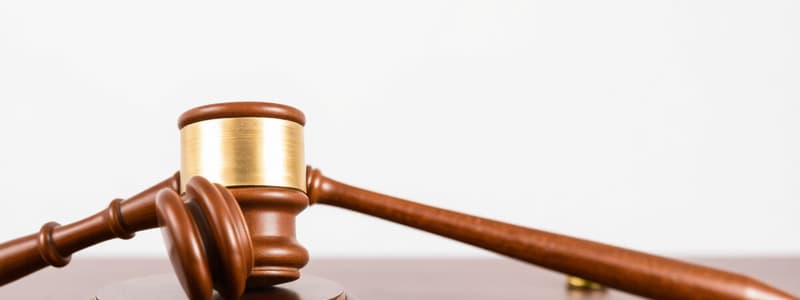Podcast
Questions and Answers
Which of the following is or are true?
Which of the following is or are true?
- Tentative rulings are preliminary decisions issued by a judge before a hearing on a motion
- Tentative rulings are intended to inform the parties of the court's initial thoughts on the matter, allowing them to prepare for oral argument or decide whether to contest the ruling
- If no party contests the tentative ruling, it typically becomes the final order of the court
- The procedures for issuing and contesting tentative rulings can vary by court and are governed by both state rules and local court rules
- All of the above are true (correct)
- None of the above is true
How can you access a particular judge's tentative rulings?
How can you access a particular judge's tentative rulings?
- (A) Find the judge in tentativerulings.org, and make use of the filters and search tool box.
- (B) Access the tentative rulings section found on the court's official website
- (C) Find the uploaded tentative rulings on Google Drive
- (D) Consult Lexis' Protege or Public Records
- (E) All of the above
- (F) A and B only (correct)
If a California trial court's tentative ruling does not explicitly request oral argument, under what conditions is oral argument permitted?
If a California trial court's tentative ruling does not explicitly request oral argument, under what conditions is oral argument permitted?
- If a party notifies all other parties and the court of their intention to appear by 4:00 p.m. the court day before the hearing. (correct)
- Only if the moving party requests oral argument.
- Oral argument is not permitted.
- Only if all parties agree to oral argument.
What happens if a California court's tentative ruling does not direct oral argument and no party provides notice of intent to appear?
What happens if a California court's tentative ruling does not direct oral argument and no party provides notice of intent to appear?
What is the latest time on the court day before a hearing that a party must notify the other parties and the court of their intention to appear for oral argument, if the court has not directed argument in its tentative ruling?
What is the latest time on the court day before a hearing that a party must notify the other parties and the court of their intention to appear for oral argument, if the court has not directed argument in its tentative ruling?
A court issues a tentative ruling at 2:00 p.m. the day before a hearing but does not specify whether oral argument is desired. What must a party do to ensure they can present oral argument?
A court issues a tentative ruling at 2:00 p.m. the day before a hearing but does not specify whether oral argument is desired. What must a party do to ensure they can present oral argument?
How does attempting to withdraw a motion after receiving an unfavorable tentative ruling affect the tentative ruling system?
How does attempting to withdraw a motion after receiving an unfavorable tentative ruling affect the tentative ruling system?
How would a court proceed when, say, the plaintiff's counsel did not appear at the hearing after a tentative ruling was issued?
How would a court proceed when, say, the plaintiff's counsel did not appear at the hearing after a tentative ruling was issued?
Besides the California Rules of Court, what might an attorney consult to understand the specific procedures related to tentative rulings in a particular court?
Besides the California Rules of Court, what might an attorney consult to understand the specific procedures related to tentative rulings in a particular court?
When a party fails to provide timely notice of intent to appear for oral argument after a tentative ruling is issued, what is the likely consequence?
When a party fails to provide timely notice of intent to appear for oral argument after a tentative ruling is issued, what is the likely consequence?
A court intends to communicate tentative rulings only via a website posting. Is this approach permissible under California Rules of Court, Rule 3.1308(a)?
A court intends to communicate tentative rulings only via a website posting. Is this approach permissible under California Rules of Court, Rule 3.1308(a)?
What is the status of a tentative ruling before the hearing takes place?
What is the status of a tentative ruling before the hearing takes place?
For this question, you are allowed to use tentativerulings.org
Look for the tentative ruling of Judge Kevin C. Brazile (Department 20, Los Angeles Superior Court) in Case Number: 24STCV01935 with a hearing date: July 17, 2024. What was the tentative ruling of the judge on the motion to strike?
For this question, you are allowed to use tentativerulings.org
Look for the tentative ruling of Judge Kevin C. Brazile (Department 20, Los Angeles Superior Court) in Case Number: 24STCV01935 with a hearing date: July 17, 2024. What was the tentative ruling of the judge on the motion to strike?
What should counsel do to fully understand the procedures related to tentative rulings?
What should counsel do to fully understand the procedures related to tentative rulings?
Why is citing the judge's own tentative rulings in your pleadings and motions in a case pending before the same judge helpful?
Why is citing the judge's own tentative rulings in your pleadings and motions in a case pending before the same judge helpful?
Study Notes
Tentative Ruling Availability
- The court must make its tentative ruling available by telephone and, at its option, by any other method it designates.
- This must occur no later than 3:00 p.m. the court day before the hearing.
- If the court wants oral argument, the tentative ruling must state that directly.
- The tentative ruling can also mention issues on which the court wants further argument from the parties.
- If the court has not directed argument, oral argument is allowed only if a party notifies all other parties and the court by 4:00 p.m. on the court day before the hearing of their intention to appear.
- Notice to other parties can be given by telephone or in person.
- The court must accept notice by telephone, and can designate other methods for a party to notify the court.
- The tentative ruling becomes the court's ruling if the court has not directed oral argument by its tentative ruling and notice of intent to appear has not been given.
Alternative Tentative Ruling Availability
- The court must make its tentative ruling available by telephone and, at its option, by any other method it designates.
- This must occur by a specified time before the hearing.
- The tentative ruling can mention issues on which the court wants the parties to provide further argument at the hearing.
- This procedure must not require the parties to give notice of their intent to appear.
- The tentative ruling will not automatically become the ruling of the court if such notice is not given.
- The tentative ruling or other ruling the court renders will not become the final ruling until the hearing.
- Courts must not issue tentative rulings except by following one of the two procedures above.
- An exception is posting a calendar note containing tentative rulings on the day of the hearing or announcing the tentative ruling at the time of oral argument per California Rules of Court, Rule 3.1308(b).
- As per California Rules of Court, Rule 3.1308(e), a judge is not required to issue tentative rulings.
- If a court or branch of a court adopts a tentative ruling procedure, all judges in that court or branch who issue tentative rulings must use that procedure, per California Rules of Court, Rule 3.1308(d).
- Counsel should consult local rules and practice regarding tentative rulings.
Studying That Suits You
Use AI to generate personalized quizzes and flashcards to suit your learning preferences.



